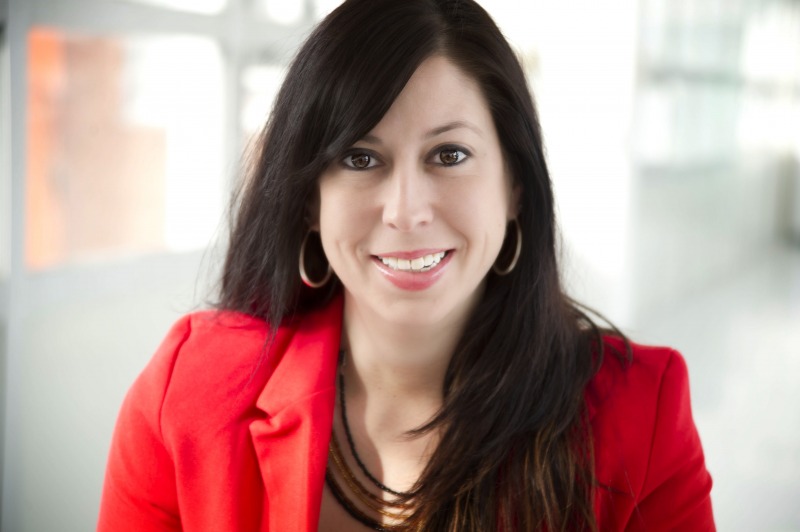We are all students

Erica Hurley is a Mi’kmaw nurse educator at Grenfell Campus’ Western Regional School of Nursing.
Recognizing the need for Indigenous knowledge and views in the Memorial University community, Ms. Hurley regularly contributes her perspectives, information and support for the continued inclusion of Indigenous content in Memorial’s nursing program and other initiatives.
Indigenizing curriculum
“For Indigenizing the curriculum in nursing, we are trying to include Indigenous content in all courses and in multiple ways,” said Ms. Hurley. “The focus is to not just have one class on Indigenous people, but to thread content throughout all aspects of the nursing program.”
For example, in one first-year nursing course students learn about cultural differences in health with a panel of speakers, one of which is Indigenous.
In another fourth-year course, students participate in a blanket exercise – an interactive teaching tool to help students understand and learn about our shared history as Indigenous and non-Indigenous Peoples in Canada.
In addition to supporting the inclusion of Indigenous content in courses, Ms. Hurley continues to explore Indigenous history and education herself, looking to expand on her existing knowledge.
This includes taking the University of British Columbia’s MOOC (massive open online course), Reconciliation Through Indigenous Education, three times.
“The first time I took the course was March 2017, and most recently I did the course again while participating in a discussion group with other educators at Memorial University,” said Ms. Hurley.
Last fall, the Centre for Innovation in Teaching and Learning (CITL) enhanced UBC’s open course by offering a guided discussion group for Memorial educators enrolled in the MOOC.
While educators completed the course at their own pace over six weeks, the group was invited to meet with an educational developer on three occasions throughout the course.
“I thought joining the discussion group would be beneficial when doing this course again, and also because as an Indigenous faculty member, I hold the belief that there is a need for Indigenous perspectives and views when discussing Indigenous people,” she added.
“The discussions highlighted needs that exist and how important it is to continue to move forward in a good way.” — Erica Hurley
Group discussions focused on localizing the course content and opening up about how individual educators can begin to integrate Indigenous content into their own courses.
“The group used the course by citing examples and discussions from it to generate dialogue,” Ms. Hurley explained. “For example, individuals discussed resources within the course, and how they may be able to incorporate the same or similar content into their own courses.”
Overarching themes
Throughout the discussions, Ms. Hurley noted overarching themes, including compensation for Indigenous knowledge holders and how to access funds to do this; a desire to incorporate Indigenous content, but unsure how to do so within a specific course; and recognition that there are a limited number of Indigenous faculty members to engage and sometimes people do not feel comfortable discussing Indigenous topics from a different worldview.
“All of these themes are not new,” Ms. Hurley said. “We discussed how there is a need for more Indigenous faculty and staff who can offer a lived experience worldview, and I think the discussions highlighted needs that exist and how important it is to continue to move forward in a good way.”
Moving forward
In addition to respectful dialogue, Ms. Hurley stresses that reconciliation must happen through actions and not just words.
“What is key to understand is that moving forward with Indigenous education is a process. Sometimes we want to push forward, but it is important to make sure resources and supports are in place so that everyone succeeds moving forward together. And it is critical to have Indigenous voices present, and more than just one when discussing Indigenous people.”
And while there is merit to borrowing resources from other places, Ms. Hurley urges the Memorial community to look a little closer to home.
“I would encourage individuals to first look at what resources we have here in this province, because we have a lot. Our histories, and thus our needs, would be different perhaps than other places, and we should rely on our people and knowledge from here wherever possible.”
“Reconciliation is a collaborative process but it must be done together, through a relationship built on understanding and respect.” — Erica Hurley
CITL will be hosting the guided discussion group again this April, when UBC’s open course is offered again.
Ms. Hurley believes that everyone at Memorial would benefit from participating, including administration, faculty, staff and students.
“I definitely benefited from participating in this discussion group, because it is always good to hear different perspectives, non-Indigenous and Indigenous. Reconciliation is a collaborative process, but it must be done together, through a relationship built on understanding and respect.
“As an Indigenous person, I recognize that I do not know everything and will not know it all,” she continued. “Therefore, it is important to always move forward understanding that we, ourselves, are all students.”
Anyone interested in learning more about the next Indigenous education discussion group can contact Jason Geary, educational developer, CITL.